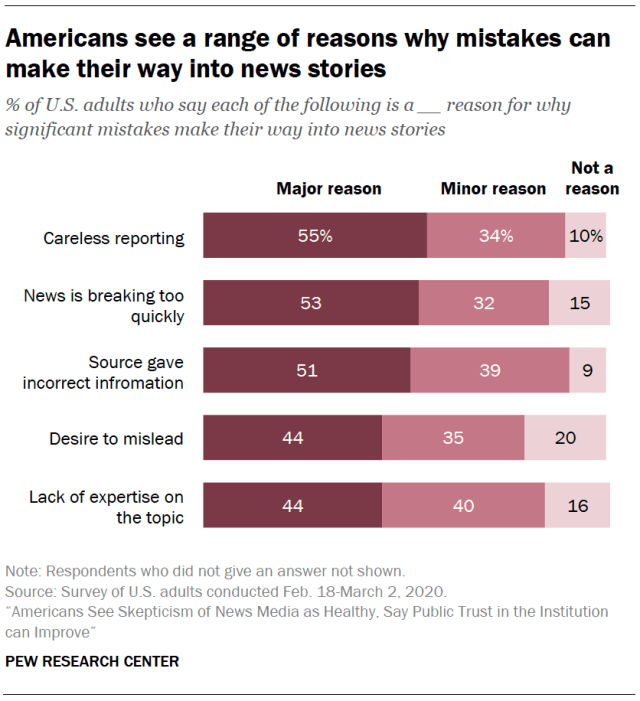☀️ Good morning! The Briefing is your guide to the world of news and information. Sign up here!
In today’s email:
- Top story: Dangerous reporting conditions and competing narratives in Israel-Hamas war
- In other news: X rolls out annual fee for new users in select countries to combat bot activity
- Looking ahead: YouTube attempts to boost news from “authoritative sources”
- Chart of the week: Reasons why Americans think that mistakes can make their way into news stories
🔥 Top story
The war in Israel, Gaza and surrounding areas has created a treacherous situation for journalists and made accurate news reporting difficult. At least 19 journalists have been killed in the conflict, according to the Committee to Protect Journalists. Meanwhile, the explosion at a Gaza hospital on Tuesday led to competing narratives about who was responsible and uncertainty about what actually happened.
In 2019, we asked Americans how confident they were in their own ability to check the accuracy of a news story. About three-in-ten (29%) said they were very confident they would know what steps to take if they wanted to check the accuracy of a news story themselves, while 46% were only somewhat confident and 24% were not too or not at all confident.
Reports on the cause of the hospital tragedy vary widely depending on which sources are cited. But in 2021, we found that just 22% of U.S. adults say they pay very close attention to the sources in news stories, while 45% pay somewhat close attention to them and about a third pay little or no attention.
📌 In other news
- X rolls out $1 annual fee for new users in New Zealand and the Philippines to combat bot activity
- MSNBC shuffles anchor roles amid Israel-Hamas war
- Local news outlets funded by philanthropies are blending journalism with grassroots community work
- The Epoch Times, a right-wing conspiracy niche, grows its reach and revenue
- Successful collaborative journalism debunks false information in West Africa
- A look into how an Instagram meme page became a key news source in Miami
📅 Looking ahead
This week, Google announced that YouTube will roll out a new immersive watch page experience designed to suggest more news content from “authoritative sources.” Google has also pledged $1.6 million to promote the creation of short-form news content with news organizations.
A quarter of U.S. adults said in a 2022 Center survey that they regularly get news on YouTube, greater than the share who get news on any other social media site except Facebook (31%).
📊 Chart of the week
With misinformation and competing narratives circulating in the coverage of the Israel-Hamas war, this week’s chart looks at various reasons why Americans believe mistakes can make their way into news stories. About half of U.S. adults (55%) site careless reporting as a major reason why mistakes make their way into news stories. Similar portions cite news breaking too quickly (53%) and incorrect information from sources (51%) as reasons.

👋 That’s all for this week.
The Briefing is compiled by Pew Research Center staff, including Naomi Forman-Katz, Jacob Liedke, Sarah Naseer, Christopher St. Aubin, Luxuan Wang and Emily Tomasik. It is edited by Katerina Eva Matsa, Michael Lipka and Mark Jurkowitz, and copy edited by Anna Jackson.
Do you like this newsletter? Email us at journalism@pewresearch.org or fill out this two-question survey to tell us what you think.